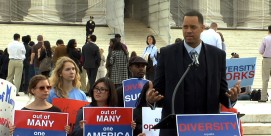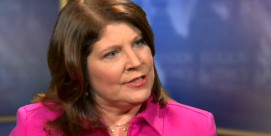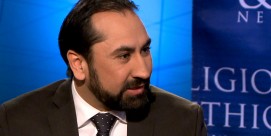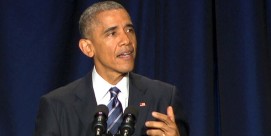In This Episode << SLIDE LEFT TO SEE ADDITIONAL SEGMENTS
News Roundup
BOB ABERNETHY, host: The nation’s Roman Catholic bishops gathered in Seattle this week for their annual spring meeting. A key part of the agenda was reviewing sex abuse prevention policies they adopted in 2002. The bishops passed minor revisions but said overall the guidelines have “served the church well.” Still, there are lingering questions about compliance and accountability.
Joining me now is Kim Lawton, managing editor of this program. Kim, are the bishops really following those 2002 guidelines?
KIM LAWTON, managing editor: Well, they say the majority of bishops are following the guidelines, but there are a couple who are not, and that has lead to some pretty high-profile scandals—one in Philadelphia, another one most recently that, last couple weeks in Missouri, where the local bishop had to apologize for a priest that was arrested on child pornography charges.
ABERNETHY: And whether a bishop has to follow those 2002 guidelines is up to the bishop. There’s no way that the other bishops can make him do that, right?
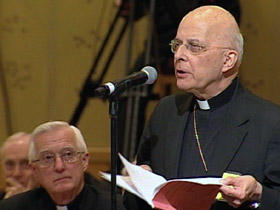 LAWTON: Well, they are nonbinding, and the bishops say that they don’t have the authority to discipline or impose penalties, that only the pope can discipline a bishop. So therefore they say this has to be part of the “fraternal correction,” and it is sort of voluntary.
LAWTON: Well, they are nonbinding, and the bishops say that they don’t have the authority to discipline or impose penalties, that only the pope can discipline a bishop. So therefore they say this has to be part of the “fraternal correction,” and it is sort of voluntary.
ABERNETHY: The Southern Baptists, Southern Baptist Convention, also gathered this week in Phoenix and took steps to make their denomination more diverse, more ethnic diversity. It elected an African American from New Orleans as a first vice-president, on track to become perhaps the president of the Southern Baptist Convention in a year.
LAWTON: Perhaps.
ABERNETHY: Perhaps. So there’s something going on there.
LAWTON: Well, they are trying to reach out, I think. There has been some apologies for racism in the past. But they are trying to reach out as well. There was some concern that they have been declining in baptisms and even a slight decline in membership. They’re still the largest Protestant denomination, of course.
ABERNETHY: Sixteen million, is it?
LAWTON: Sixteen million.
ABERNETHY: I was thinking about this Libya thing and the Congress putting pressure on the president. There’s a relationship, isn’t there, to a religious tradition?
LAWTON: Well, the political debate is whether or not the president has the authority to authorize and continue the military effort in Libya without congressional authorization, and the just war tradition also says that in order for military action to be just it has to have the sanction of the proper authorities, and so there is that moral connection that the political debate is also sort of tied to, and there’s been another debate in the religious community I’ve been watching as well. I’m seeing increasing numbers of religious conservatives raising concerns about the Libya action. Many of them had been supportive in other military efforts, but on this one raising concerns on moral issues, economic moral issues, raising questions about whether or not it’s moral to spend that much money—over $700 million dollars—on this effort.
ABERNETHY: Kim, many thanks.


